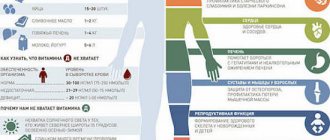Herb Pharmacy » useful articles
Fatigue, apathy, bad mood, and malaise, which often occur during the off-season, may be associated with vitamin deficiency. These valuable substances have a huge impact on the functioning of the human body and maintaining excellent health.
What substances are called vitamins? What species are known? Where are they found in nature? Which synthetic additives are most effective and which are less effective? Below, we will try to find answers to all these questions.
Types of vitamins
Modern science has discovered 13 vitamins; a person can get them with food, from vegetables, fruits, meat, or from special industrial complexes.
Fat-soluble type
This group includes those substances that dissolve in a fatty environment.
These include the following connections:
- retinol;
- calciferol;
- tocopherol;
- phylloquinone.
Excess fat-soluble vitamins are excreted outside the body. Excessive consumption of these compounds is dangerous to human life.
Water-soluble species
The group includes compounds that dissolve in an aqueous environment. These include vitamin C and B vitamins.
B vitamins are:
- thiamine;
- riboflavin;
- a nicotinic acid;
- AT 5;
- AT 6;
- AT 7;
- folate;
- cyanocobalamin.
These vitamins are very important for humans; they are not deposited in tissues and are easily excreted outside the body.
Vitamin-like
These compounds are classified in a separate group. They do not have the characteristics characteristic of vitamins, but they have some of their properties.
Here, too, there is a division into the ability to dissolve in water and fat.
Fat-soluble: vitamins F, N; coenzyme Q.
Water soluble:
- choline;
- inositol;
- para-aminobenzoic acid;
- L – carnitine;
- orotate;
- pyrroloquinoline quinone;
- pangamic acid;
- B16;
- B17;
- bioflavonoids;
- U.
Will a “magic pill” with 30 ingredients save us?
The Russian Academy of Medical Sciences claims that 80% of us suffer from a lack of vitamins. Their quantity in food products is catastrophically decreasing every year. However, you should not mindlessly drink all the vitamins in a row. Not all of them are “equally useful”, as in the famous advertisement.
Studies have shown that iron is not absorbed together with calcium. An overdose of vitamins A and D is worse than a deficiency. B vitamins can cause allergies. Beta-carotene and selenium do not protect against cancer. Large doses of vitamin C do not protect against colds. We need a reasonable approach.
Functions of vitamins
Vitamins are components of enzymes and hormones; only at their required level can the body launch a full-fledged metabolic process.
What is the biological role of vitamins:
- hematopoiesis;
- protecting the body from toxic effects and harmful effects of radionuclides;
- ensuring the full functioning of various systems of the human body.
| Name of the compound, its daily dosage | Functions performed | Where can I find |
| Beta-carotene (1300 mcg) | · work of immunity; maintaining vision; · maintaining healthy skin | Bright vegetables, fruits, sweet potatoes, mangoes, spinach, carrots |
| Retinol (1000) | · skin health; · strength of bones, teeth; maintaining healthy mucous membranes | Dairy products, chicken, fish, meat |
| B1 (1.8 mg) | · breakdown of carbohydrates; energy production | Cereals, legumes, meat, nuts |
| B2 (20 mg) | · combating the effects of free radicals; control over the formation and growth of red blood cells | Yeast, organ meats, almonds, mushrooms, broccoli, spinach, eggs, whole grain bread, milk |
| B3 (5 mg) | · produces serotonin, melatonin; · reduces the level of “bad” cholesterol | Beets, green vegetables, eggs, dairy products, fish, yeast, chicken, meat |
| B5 (5 mg) | · responsible for memory; · synthesizes sex hormones, red blood cells; Regulates the functioning of the gastrointestinal tract | Meat, chicken, unprocessed grains, turkey, whole grains, vegetables, egg yolk, vegetables |
| B6 (2 mg) | · immune support; hemoglobin production; · takes part in protein metabolism | Bananas, avocados, nuts, beans, meats, whole grains |
| B7 (50 mcg) | · skin protection; · reduction of mental tension; glycogen metabolism | Whole grains, mushrooms, cauliflower, nuts, yeast, eggs, legumes, bananas |
| B9 (400 mcg) | · cellular construction; · reducing the risk of developing heart disease and weakening of blood vessels; · reducing the likelihood of fetal defects | Spinach, broccoli, leafy vegetables, yeast, banana, mushrooms, melon, lettuce |
| B 12 (3 mcg) | · protection against the development of cardiovascular diseases and cancer | Dairy products, beef, fish, eggs, chicken |
| Ascorbic acid (90 mg) | · strengthening the immune system; · protection of the circulatory system; · preventing the negative effects of free radicals; · protection of cells from premature withering; · removal of toxins | Fresh fruits, vegetables |
| Vitamin D (15 mcg) | Regulates the absorption of phosphorus and calcium | Produced in the skin under the influence of sunlight. Liver, yolk, beef |
| Tocopherol (15 mg) | · protection of cells from oxidative processes; · work of immunity; · prevention of the development of senile dementia | Seeds, vegetable oil, nuts, spinach, melon, coriander, apricots, cabbage |
Vitamin B5 – pantothenic acid.
Discovery history and interesting facts:
It got its name from the Greek word, which translated means “omnipresent”. And this is true, vitamin B5 is found in every tissue, in every cell of a living organism. Pantothenic acid performs important functions for the normal functioning of physiological processes. Pantothenic acid was first isolated in 1933 by scientists at the University of Texas at Austin. Using brewer's yeast as a model organism, they isolated a previously unknown nutrient. The essential function of pantothenic acid was determined in 1953 with the discovery of coenzyme A (coenzyme A or CoA). Vitamin B5 is a substrate for the body's production of CoA, without which our cells cannot feed and function properly. Therefore, sufficient presence of pantothenic acid in the body is a prerequisite for maintaining normal life functions.
Role in the body:
— as a structural component of CoA, vitamin B5 is involved in the metabolism of macronutrients: proteins, fats, carbohydrates, cholesterol and fatty acids;
- participates in the biosynthesis of hormones - steroid and sex hormones, growth hormone;
- actively participates in the formation of erythrocyte hemoglobin, histamine synthesis and antibody production;
— vitamin B5 is involved in the synthesis of neurotransmitters of the nervous system, especially important for the conversion of choline into acetylcholine.
Daily requirement: children under 1 year – 2 mg; adults – from 5 to 10 mg.
When does the body lack vitamins?
Having found out why the human body needs vitamins, you need to focus on those cases when taking them is required.
Taking synthetic vitamins is necessary in the following cases:
- diet including monotonous foods;
- lack of a balanced diet;
- weight loss process;
- frequent being under stress;
- chronic diseases;
- treatment with medications that reduce the absorption of vitamins and minerals;
- period of illness;
- recovery after surgery;
- receiving sports loads;
- vegetarianism;
- therapy with hormonal medications;
- taking oral contraceptives;
- elderly age;
- postpartum period;
- breast-feeding;
- intense mental stress;
- childhood;
- bad habits.
Vitamins are useful for all ages. In mild cases of deficiency, it is enough to establish the correct diet; in severe situations, it is impossible to do without taking special complexes or administering them with injections.
We look at the symptoms of vitamin deficiency in the table.
| Vitamin name | Manifestations | Names of drugs to correct the deficiency |
| A | · blurred vision at dusk; keratomalacia; dry cornea | Retinol acetate |
| AT 3 | · disorders of the gastrointestinal tract; · dermatitis; · mental disorders | A nicotinic acid |
| AT 6 | · anemia; · disturbances in the functioning of the nervous system; peripheral neuropathy | Nerviplex, Pyrodoxine hydrochloride |
| AT 7 | · dermatitis; · enteritis; · inflammatory processes in the intestines | Biotin |
| AT 9 | Congenital defects in the fetus | Folacin |
| AT 12 | · disruption of red blood cell production | Neurobex |
| WITH | · production of “wrong” red blood cells | Ascorbic acid |
| Vitamin D | · anemia; · rickets; decreased bone density, increased fragility | Aquadetrim, Ergocalciferol |
Vitamin B3 (vitamin PP) – niacin, nicotinamide.
Discovery history and interesting facts:
This is a family of vitamin PP, which includes two related compounds: nicotinic acid and its amide. Nicotinic acid has been known for a long time: back in 1866, it was obtained by oxidation of nicotine isolated from tobacco. However, until the 40s of the 20th century, no one suspected that it had vitamin activity. It was recognized as a vitamin after it was found that nicotinic acid perfectly cures pellagra, a serious disease from which thousands of people who ate mainly corn suffered. Hence the name “vitamin PP” - from the initial letters of two Latin words “preventive pellagra” - “preventing pellagra”.
Role in the body:
- together with vitamins B1 and B2, participates in energy metabolism processes - they contribute to the conversion of carbohydrates, proteins and fats into energy;
- has a vasodilating effect, promotes wound healing;
- has hypolipidemic activity - causes a decrease in total cholesterol, atherogenic low-density lipoproteins and especially triglycerides;
- nicotinamide is involved in the synthesis of cortisone, thyroxine and insulin.
Daily requirement: children under 1 year – 5 mg; adults – from 15 to 20 mg.
Types of synthesized vitamins
Taking into account the needs of the human body, special synthetic forms of vitamins have been developed. They are available in liquid and dry forms and are absorbed faster than those that a person receives from food. To avoid the possibility of an overdose, you must take such drugs strictly according to the manufacturer's instructions.
Synthesized vitamins come in liquid and dry forms.
Liquid forms are easier to absorb by the body and are safe for children. There are the following types:
- oil-based: used for external use, they are applied to the skin, hair, nails;
- in ampoules: used for intramuscular injections, recommended for people with gastrointestinal diseases, because they do not come into contact with mucous membranes, causing their damage;
- syrups: used in childhood, the benefits of vitamins are combined with a pleasant taste and smell.
Dry types of synthetic vitamins:
- tablets: they are easy to store and transport;
- capsules: have a gelatin shell, are broken down directly in the gastrointestinal tract, where they begin to act;
- gel, marmalade: specially designed for children, have a pleasant taste and aroma;
- powders: have a high concentration, do not contain dyes or additives, and have maximum efficiency.
Purchased vitamins must be stored correctly, otherwise they may deteriorate and lose their properties. They change under the influence of:
- oxygen;
- high humidity, air temperature;
- acidic, alkaline environment;
- sunlight;
- microorganisms;
- bacteria.
How do they work
All about vitamins
Almost everyone needs multivitamin complexes. We tell you what you need to know about vital substances, why they are needed, how hypovitaminosis manifests itself, and why it is best to drink multivitamins.
Since then, scientists have discovered dozens of similar substances and understood the mechanism of their action on the human body. Vitamins do not supply energy like proteins, fats and carbohydrates, but they are involved in metabolism and help normalize almost all processes in the body
.
A person gets most vitamins only from food
, because our body is able to synthesize only some of them, and then in insufficient quantities.
What vitamin complexes should I buy?
Having figured out what vitamins are for, you need to understand that in order to get rid of a deficiency, it is unlikely that it will work only with the help of vegetables, fruits, fish and meat. Sometimes only taking special complexes helps solve the deficiency problem.
For immunity
Fruttilar Evalar: is a source of vitamins such as ascorbic acid, tocopherol, elderberry extract. They are in the form of lozenges that can be chewed like regular marmalade.
Multi Tabs Immuno plus: contains vitamins, minerals, probiotic with lactobacilli.
Complivit: contains vitamins, microelements, and has a low cost.
Centrum: used in children over 12 years of age, it contains a complex of vitamins and microelements. An important advantage is the large number of antioxidants.
Supradin Immuno Forte: echinacea, vitamin C, zinc, propolis.
For vision
What vitamins are there for the eyes? Okuwait Forte is recognized as one of the most popular. Contains lutein, zeaxanthin, carotenoids. Protects the retina from negative influences, reduces the risk of developing changes, and stops inflammatory processes.
To maintain beauty
Doppelhertz: accelerates metabolic processes, stimulates cellular renewal. Works to improve the condition of the skin, stimulate hair growth, and strengthen nails.
Solgar: contains methylsulfonylmethane, which transports sulfur, collagen, keratin. The presence of ascorbic acid, zinc, and copper enhances the positive effects of the drug. A course of treatment increases the elasticity of the skin and regulates the functioning of the sebaceous glands.
Merz: vitamins contained here (L-cysteine, iron, B vitamins, ascorbic acid, retinol) perform various functions. Dragees help increase the strength of connective tissues and stimulate cellular renewal processes.
Vitrum Beauty: contains 10 vitamins, enhanced with bioflavonoids and amino acids.
Complivit Radiance: includes green tea extract and 10 vitamins. Used to strengthen hair follicles and eliminate dandruff.
For men's health
Solgar for men: helps in easily overcoming stress, normalizing hormonal levels, increasing performance, strengthening the immune system.
Doppelherz for future dads: all the vitamins necessary for conception are collected here. Contains components to improve prostate function.
Doppelgerz Spermactive: increases libido, increases sensitivity during sexual intercourse, strengthens erection, improves the quantity and quality of sperm, stimulates their motility.
Pharma Honey "Men's Formula": aimed at increasing the body's immune forces, normalizing blood circulation processes, increasing vitality, normalizing the functioning of the cardiovascular system. Helps with high fatigue, decreased intellectual capabilities, and memory loss. Contains 26 minerals, vitamins for the male body, valuable plant extracts.
Pharma Med "Male Formula" Forte: prevents the occurrence of sexual dysfunction, improves blood circulation in the pelvic organs, enhances potency, increases the duration of sexual relationships, and prevents premature ejaculation.
Men's Multivitamin Formula: Created to support the health of people involved in sports. Contains 12 vitamins, 9 elements. Increases endurance, normalizes sleep, increases energy, vigor, and normalizes the functioning of the reproductive organs.
Parity Evalar: designed to stimulate potency, contains roots of Eurycoma longifolia, yohimbe. Helps normalize testosterone production and stimulate libido.
For children
Doppelhertz Kinder: These vitamins are an excellent choice for keeping children's bodies healthy. Contains the entire group of B vitamins, glycine, ascorbic acid. The complex has a pleasant taste of raspberry and orange, which does not create problems during use. Taking vitamins helps strengthen the nervous system, increases mental activity, normalizes sleep, stabilizes the psycho-emotional background, and stabilizes metabolic processes in the brain.
Fruttilar company Evalar: is produced in the form of marmalade, reminiscent of chewing candies. Contains B vitamins, retinol, ascorbic acid.
Multi Tabs Immuno Kids: used in children from three years old. Contains B vitamins, tocopherol, ascorbic acid, vitamins K, D, 6 minerals, lactobacilli.
Vitrum Kids: approved for use in children over 3 years old. It looks like gummy animals with a pleasant taste. Contains a wide range of vitamins.
Pikovit: there are several varieties approved for use from 1, 3, 4 and 7 years.
Adult complexes
Doppelhertz A to Zn: used to restore people who often experience mental and physical stress. Can be used to prevent the development of deficiency conditions. Contains 13 vitamins. 11 minerals. Works to strengthen the immune system, increasing the body's resistance to stress.
Selmevit: suitable for people recovering from surgery, injuries, and chronic pathologies. The drug contains vitamins and minerals that increase the body's resistance to negative factors.
Undevit: an inexpensive drug containing calcium, ascorbic acid, retinol, tocopherol, B vitamins and vitamin P. Indicated for use by weakened people for recovery after illnesses. Suitable for use in old age to establish normal metabolism.
Solgar Multi-1: differs from other drugs in that all its components are presented in easily digestible forms. Contains a line of basic vitamins, as well as chromium, zinc, selenium, magnesium, iodine, rutin, copper, bioflavonoids. For ease of absorption by the body, organic betaine hydrochloride is included in the composition.
Multi tabs: contains antioxidants, without which the proper functioning of the heart, urinary and nervous system organs is impossible. The drug is used to strengthen the body’s immune forces and increase its resistance in the fight against stress.
Vitrum: used for the prevention and treatment of vitamin deficiencies. It is often prescribed to stabilize the body’s functioning after cancer.
Complivit: contains vitamins, minerals, supplemented with cobalt, without which the full functioning of the hematopoietic system and the processing of nutrients into energy is impossible.
Complexes for pregnant women
Doppelgerz active for expectant mothers: balanced for women who are preparing for conception.
Elevit: contains an increased amount of magnesium, necessary for relaxing muscle muscles. Therefore, the drug is used to prevent miscarriage. Contains a level of folic acid sufficient for normal fetal development.
Multi Tabs Prenatal: contains the main forms of vitamins, as well as minerals - magnesium, iodine, supplemented with the right amount of folic acid.
Fruttilar from Evalar for pregnant women: contains a whole complex of vitamins and minerals. Suitable for use immediately after conception, as well as at the planning stage of pregnancy, during lactation. It is produced in an attractive form of marmalade berries, which does not create problems with administration even with severe toxicosis.
Complexes for maintaining vigor
Berocca: consists of components that support mental activity at any age, reduce the speed of reactions, and increase energy production by cells.
Alphabet Energy: all components are divided into three groups of components that need to be taken in the morning, lunch and evening. This is done in order to avoid conflict between substances and improve the degree of absorption by the body. The complex maintains human activity at a high level throughout the day.
Gerimax Energy: helps in the fight against fatigue, supports vitality. Vitamins and minerals are supplemented with extracts of green tea leaves and ginseng root.
Biorhythm Antistress company Evalar: capsules are taken in the morning and evening to restore the body’s biological rhythms, get rid of fatigue, normalize sleep, and improve its quality characteristics.
Complivit Superenergy: additionally contains guarana, which increases the level of energy in the body, relieves increased anxiety and chronic fatigue.
Doppelhertz Energotonic: has a varied composition, including vitamins, minerals, bioflavonoids. Works to combat fatigue, increases activity levels, and accelerates recovery from illnesses.
Vitamins are important components of human life. Without a sufficient amount of them, it is impossible to achieve effective and complete functioning of the body. Therefore, it is so important to monitor their quantity, avoid deficiencies, promptly adjust the diet, and take special complexes.
Also read: Can diets help with heartburn, flatulence and GERD?
Comments
Vitamin C – ascorbic acid.
Discovery history and interesting facts:
The history of the discovery of vitamin C is closely related to scurvy, which is caused by its deficiency. Beginning in the 18th century, sailors began to notice the appearance of malaise, which was manifested by general weakness, bleeding gums, loss of teeth and, in extreme cases, death. In 1753, English naval physician James Lind suggested lime and lemon as a cure for scurvy. He conducted an observation and found out that those sailors who included fruits and vegetables in their diet did not suffer from scurvy. Even if the disease had already developed, adjusting the diet in favor of vegetables and fruits made it possible to recover.
The discoverer of vitamin C is the Hungarian biochemist Albert Szent Gyori. In 1927, he first isolated acid, which, in his opinion, was the very vitamin that saves from scurvy. Four years later, University of Pittsburgh professor Charles Glen King tests a powder extracted from cabbage and lemon juice on guinea pigs. The chemical formula turned out to be equivalent to the substance St. Gyori and on April 4, 1932, the composition of vitamin C was officially registered. A little later, the name ascorbic acid is assigned, which comes from the Latin “scorbutus” - scurvy and the negation of “a”.
Role in the body:
— vitamin C has a powerful antioxidant effect – it participates in redox reactions and protects cell membranes;
– helps strengthen the immune system and increase the body’s protective functions;
- improves the functioning of the circulatory system - strengthens the walls of blood vessels, removes LDL, significantly reducing the risk of developing atherosclerosis;
- helps absorb iron - prevents the development of anemia;
- actively participates in the production of collagen, thereby helping wound healing;
- participates in the regeneration of connective and bone tissues.
Daily requirement: children under 1 year – 30 mg; adults – 60 mg.
Microflora disturbance
If disruptions occur in the intestinal microflora, various problems begin, including with the production of vitamins. “Disturbance in the production of vitamins begins when something is wrong with the microflora. Bloating, gas formation, gurgling, grumbling, puffing up - this is an obvious sign of a malfunction of the microflora,” notes gastroenterologist-hepatologist Sergei Vyalov .
At the same time, there is no need to panic right away, since the body has support. “The vitamins are in some supply, so they will last for some time. And sooner you will have time to pay attention to other problems than to failures due to problems with the functioning of the microflora,” says the doctor.
There is a certain period of time that can be waited without any serious damage to health: 2-4 weeks. The main thing during this period is to exclude spicy and sweet foods from your diet, advises the gastroenterologist. This will allow you not to feed the microflora, which is already malfunctioning. Ideally, everything should recover on its own.
But there may also be unexpected consequences of such a situation. “Due to the fact that our microflora is disrupted and there is increased gas formation, there are not enough vitamins, two types of problems arise. The first one is known to everyone: irritable bowel syndrome. Here pain appears plus some stool disturbances. This could be diarrhea, constipation, or a combination of both.
A spoonful of bran and avocado. Why our intestines need fiber Read more
The second option is a violation of hormone synthesis in the intestines. Hormones are responsible for the feeling of fullness, so with such a failure we have an immense glutton and we overeat. This is due to the fact that hormones are responsible for ensuring that when food reaches the desired parts of the intestine deep below, the brain receives a signal that it’s enough to eat. Or, conversely, that you need to eat more. When this signal is compromised, we are on a fast track to obesity. Moreover, a feeling of hunger may develop when there is only gurgling in the stomach, but everything is fine with the stool,” recalls Sergei Vyalov.
Only one piece of advice may be relevant here: do not start the problem. Because there are risks of serious deterioration. “You need to properly limit spicy and sweet foods so as not to feed the microflora, which is already disturbed. Perhaps this will be enough, and then after a week or two you can return all these products back to yourself and observe. If it hasn’t gone away within 2 weeks, hasn’t changed in any way due to a change in diet, or has returned when foods were returned to the diet, it definitely won’t go away on its own,” says the doctor.
Everything in the body is interconnected, and especially in the intestines. And it is important to carefully monitor its condition so that the microflora provides all the necessary functions: the formation of immunity, the production of vitamins, etc. Otherwise, problems with the digestive system may arise, which will take a long and difficult time to solve.
What to look for
Vitamins are complex organic compounds. Each vitamin makes its own irreplaceable contribution to the life of the body. When taking vitamins, it is very important to remember the dosages and courses, and also consider the interaction of some vitamins with each other. Some substances may cause allergic reactions, so it is better to consult a doctor before use.
Remember that dosages are individual, they depend on the person’s activity - an athlete needs more support with vitamins and minerals than a person who does not play sports. It is also necessary to take into account the time of year, physiological needs and individual characteristics of a person. For example, a person who has had a cold needs much more vitamins.
In any case, take care of yourself, listen to your body and provide it with vitamin support on time.
Conclusion
If your diet is not entirely balanced, consider how you can diversify it and include foods rich in vitamins. Vitamin tablets should be taken if you have increased vitamin requirements or if you are actively involved in sports.
When choosing vitamins, give preference to a trusted manufacturer.
Articles on our website are presented for educational and informational purposes only. We do not recommend using article materials as medical advice. If you decide to take dietary supplements or make fundamental changes to your diet, first consult with a specialist.
In this video, nutritionist Stanislav Sheremetyev will talk about the main vitamins and who should take them and when:











